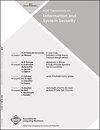Authenticated Dictionaries: Real-World Costs and Trade-Offs
Q Engineering
ACM Transactions on Information and System Security
Pub Date : 2011-09-01
DOI:10.1145/2019599.2019602
引用次数: 35
Abstract
Authenticated dictionaries are a widely discussed paradigm to enable verifiable integrity for data storage on untrusted servers, such as today’s widely used “cloud computing” resources, allowing a server to provide a “proof,” typically in the form of a slice through a cryptographic data structure, that the results of any given query are the correct answer, including that the absence of a query result is correct. Persistent authenticated dictionaries (PADs) further allow queries against older versions of the structure. This research presents implementations of a variety of different PAD algorithms, some based on Merkle tree-style data structures and others based on individually signed “tuple” statements (with and without RSA accumulators). We present system throughput benchmarks, indicating costs in terms of time, storage, and bandwidth as well as considering how much money would be required given standard cloud computing costs. We conclude that Merkle tree PADs are preferable in cases with frequent updates, while tuple-based PADs are preferable with higher query rates. For Merkle tree PADs, red-black trees outperform treaps and skiplists. Applying Sarnak-Tarjan’s versioned node strategy, with a cache of old hashes at every node, to red-black trees yields the fastest Merkle tree PAD implementation, notably using half the memory of the more commonly used mutation-free path copying strategy. For tuple PADs, although we designed and implemented an algorithm using RSA accumulators that offers constant update size, constant storage per update, constant proof size, and sublinear computation per update, we found that RSA accumulators are so expensive that they are never worthwhile. We find that other optimizations in the literature for tuple PADs are more cost-effective.认证字典:现实世界的成本和权衡
经过身份验证的字典是一种被广泛讨论的范例,用于在不受信任的服务器(例如今天广泛使用的“云计算”资源)上实现数据存储的可验证完整性,它允许服务器提供“证明”(通常以加密数据结构中的切片形式),证明任何给定查询的结果是正确的答案,包括没有查询结果是正确的。持久身份验证字典(pad)进一步允许对结构的旧版本进行查询。本研究提出了各种不同的PAD算法的实现,一些基于Merkle树式数据结构,另一些基于单独签名的“元组”语句(有或没有RSA累加器)。我们提供了系统吞吐量基准,表明在时间、存储和带宽方面的成本,并考虑在给定标准云计算成本的情况下需要多少钱。我们得出结论,在频繁更新的情况下,Merkle树pad更可取,而基于双元组的pad更可取,查询率更高。对于默克尔树pad来说,红黑树的表现优于树堆和跳跃树。将sarak - tarjan的版本节点策略应用于红黑树,在每个节点上都有旧散列缓存,可以产生最快的Merkle树PAD实现,特别是使用更常用的无突变路径复制策略的一半内存。对于元组pad,尽管我们使用RSA累加器设计并实现了一种算法,该算法提供恒定的更新大小、每次更新的恒定存储、恒定的证明大小和每次更新的次线性计算,但我们发现RSA累加器非常昂贵,根本不值得使用。我们发现文献中针对元组pad的其他优化更具成本效益。
本文章由计算机程序翻译,如有差异,请以英文原文为准。
求助全文
约1分钟内获得全文
求助全文
来源期刊

ACM Transactions on Information and System Security
工程技术-计算机:信息系统
CiteScore
4.50
自引率
0.00%
发文量
0
审稿时长
3.3 months
期刊介绍:
ISSEC is a scholarly, scientific journal that publishes original research papers in all areas of information and system security, including technologies, systems, applications, and policies.
 求助内容:
求助内容: 应助结果提醒方式:
应助结果提醒方式:


